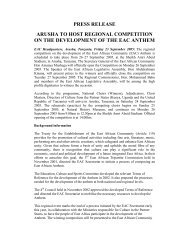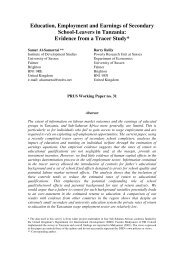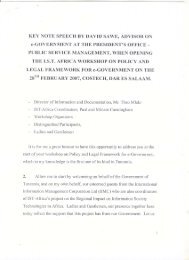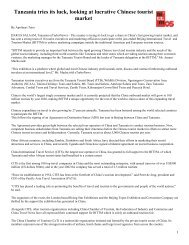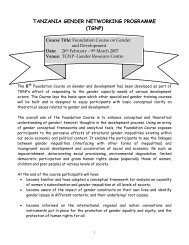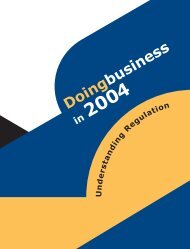Designing e-Government for the Poor - Tanzania Development ...
Designing e-Government for the Poor - Tanzania Development ...
Designing e-Government for the Poor - Tanzania Development ...
Create successful ePaper yourself
Turn your PDF publications into a flip-book with our unique Google optimized e-Paper software.
42<br />
Conducive policy environment <strong>for</strong> e-government<br />
• No preferences <strong>for</strong> specific technology solutions or plat<strong>for</strong>ms<br />
• Technology neutrality funding <strong>for</strong> research and development<br />
• Interoperability between hardware and software<br />
• Key component of e-government initiatives<br />
• Promotes choice, competition and innovation<br />
Mr. Chong gave <strong>the</strong> example of Hong Kong, China. Hong Kong,<br />
China adopted open standards and an interoperability framework to assist <strong>the</strong><br />
<strong>Government</strong> in defining interfaces between <strong>the</strong>ir applications, and developing<br />
a common Chinese language interface. The open standards policy and<br />
interoperability created a citizen-centric seamless e-government in which <strong>the</strong><br />
government worked as a single organization with seamless flow of in<strong>for</strong>mation<br />
across different government departments. As a result, <strong>the</strong> Hong Kong,<br />
China citizen can go to <strong>the</strong> <strong>Government</strong> web site to find a job, take part in<br />
<strong>the</strong> electronic tendering system, or book a registration date <strong>for</strong> marriage.<br />
Policies that maintain a secure online environment are <strong>the</strong> third<br />
category of policies that are key components of e-government initiatives.<br />
Security requires protection of digital commerce, network security, and<br />
intellectual property regulations. Digital commerce is threatened by spam,<br />
convergence of hacking communities, and o<strong>the</strong>r online fraud. Network<br />
security is guaranteed through cybercrime legislation.<br />
The following are steps taken to secure digital commerce:<br />
• Technology and training<br />
• Industry self regulation through sharing of in<strong>for</strong>mation on<br />
wrongdoers<br />
• Legislation and policy initiatives including criminal deterrence<br />
• En<strong>for</strong>cement<br />
The legal framework established by <strong>the</strong> 2001 Council of Europe<br />
Convention on cybercrime, and approved by APEC, provides measures to<br />
monitor cybercrime. A secure online environment also requires encryption<br />
and au<strong>the</strong>ntication. Encryption improves online security and increases consumer<br />
confidence. For example, in Hong Kong, China, <strong>the</strong> Electronics<br />
Transaction Ordinance of 2000 provided a clear and conducive legal<br />
framework in which electronic records and digital signatures are given <strong>the</strong><br />
same legal status as paper counterparts. The ordinance also lays <strong>the</strong><br />
framework <strong>for</strong> voluntary recognition scheme <strong>for</strong> certification authorities to<br />
operate freely.<br />
Mr. Chong said that e-government systems need to provide protection<br />
of personal in<strong>for</strong>mation or privacy by con<strong>for</strong>ming to international<br />
treaties, <strong>the</strong> Organization <strong>for</strong> Economic Co-operation and <strong>Development</strong>



